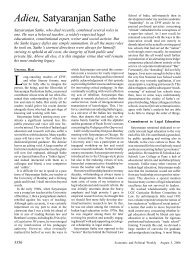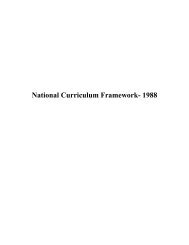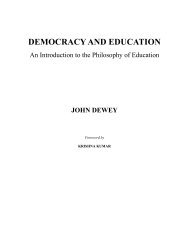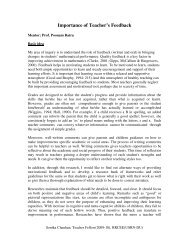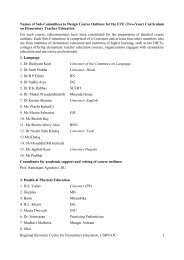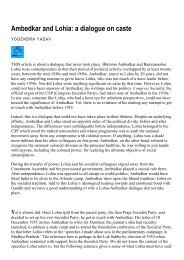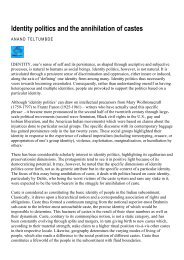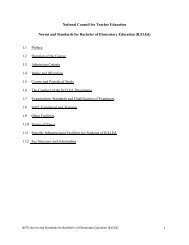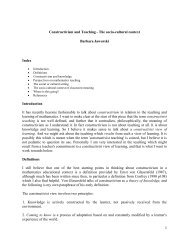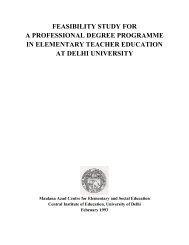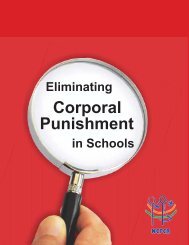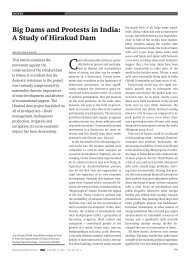Minority Rights in Education - eledu.net
Minority Rights in Education - eledu.net
Minority Rights in Education - eledu.net
You also want an ePaper? Increase the reach of your titles
YUMPU automatically turns print PDFs into web optimized ePapers that Google loves.
content of that article is as wide as the choice of the particularm<strong>in</strong>ority community may make it.To quote him aga<strong>in</strong> (AIR 1958 SC 979),There is no limitation placed on the subjects to be taught <strong>in</strong> sucheducational <strong>in</strong>stitutions. As such m<strong>in</strong>orities will ord<strong>in</strong>arily desirethat their children should be brought up properly and efficientlyand be eligible for higher university education and go out <strong>in</strong> theworld fully equipped with such <strong>in</strong>tellectual atta<strong>in</strong>ments as will makethem fit..., educational <strong>in</strong>stitutions of their choice will necessarily<strong>in</strong>clude <strong>in</strong>stitutions impart<strong>in</strong>g general secular education also.This view is confirmed <strong>in</strong> the case of St Xavier’s College vs Stateof Gujarat (AIR 1974 SC 1389) by a bench of n<strong>in</strong>e court judges.However, <strong>in</strong> the All Sa<strong>in</strong>t’s High School (AIR 1980 SC 1043), thecourt laid down broad pr<strong>in</strong>ciples for determ<strong>in</strong><strong>in</strong>g syllabus. It statesWhere a m<strong>in</strong>ority <strong>in</strong>stitution is affiliated to a university the factthat it is enjo<strong>in</strong>ed to adopt the courses of study or the syllabi orthe nature of books prescribed and the hold<strong>in</strong>g of exam<strong>in</strong>ationto test the ability of the students of the <strong>in</strong>stitution concerned doesnot violate the freedom conta<strong>in</strong>ed <strong>in</strong> Article 30 of the Constitution.M<strong>in</strong>orities have been given a right to select medium of <strong>in</strong>struction(AIR 1954 SC 561) for their educational <strong>in</strong>stitutions. TheD A V College, Chandigarh (AIR 1971 SC 1746) made standpo<strong>in</strong>tof the court clear,Neither the University nor the State can provide for impart<strong>in</strong>geducation <strong>in</strong> a medium of <strong>in</strong>struction <strong>in</strong> a language and script whichstifles the language and script of any Section of the citizens. Sucha course will trespass on the rights of those Sections of the citizenswhich have a dist<strong>in</strong>ct language or script and which they have aright to conserve through educational <strong>in</strong>stitutions of their own.However, “the State can provide for the study of the Statelanguage as compulsory second language” [Desai 1996:206].It is important to note <strong>in</strong> this context that even the aided educational<strong>in</strong>stitutions established by the religious m<strong>in</strong>orities cannotimpart religious education unless such provision is made <strong>in</strong> thetrust deed of the <strong>in</strong>stitution. Unaided or partially aided m<strong>in</strong>ority<strong>in</strong>stitutions are free to impart religious <strong>in</strong>structions to the students.Scope for Government ControlAdm<strong>in</strong>istration of an <strong>in</strong>stitution requires constant <strong>in</strong>teractionamong the management of the <strong>in</strong>stitution and the government.As the <strong>in</strong>terests of the two are different, this generates manyconflict<strong>in</strong>g situations. Some of the contested issues are mentioned<strong>in</strong> the Pai case (Judgments Today, 2002(9) SC 15), where…it was submitted that the state should not have a right to <strong>in</strong>terfereor lay down conditions with regard to the adm<strong>in</strong>istration of…<strong>in</strong>stitutions. In particular, objection was taken to the nom<strong>in</strong>ationsby the state on the govern<strong>in</strong>g bodies of the private <strong>in</strong>stitutions, aswell as to provisions with regard to the manner of admitt<strong>in</strong>gstudents, the fix<strong>in</strong>g of the fee structure and recruitment of teachersthrough state channels.Varied <strong>in</strong>terpretation of Article 30, especially with referenceto Articles 29, is yet another cause of the tension between theGovernment and the educational <strong>in</strong>stitutions. The state’s suspicionof the m<strong>in</strong>orities especially the religious ones; evidence of misuseof provisions of Article 30; and the desire of the m<strong>in</strong>orities toavail of their Constitutional rights, especially <strong>in</strong> a state regulatededucation system are yet some more reasons for the same.<strong>M<strong>in</strong>ority</strong> educational <strong>in</strong>stitutions, <strong>in</strong> general, are educationalbodies operative <strong>in</strong> the formal educational system of India. Hence,the rules and regulations prescribed for private <strong>in</strong>stitutions bythe state, are applicable to the m<strong>in</strong>ority <strong>in</strong>stitutions unlessotherwise stated. It is also important to note that these rules andregulations cover almost every aspect of the educational <strong>in</strong>stitutionsespecially of those, which avail benefits of governmentrecognition/aid or are affiliated to universities.<strong>M<strong>in</strong>ority</strong> educational <strong>in</strong>stitutions have a right to governmentrecognition/aid or even affiliation to an university. Accord<strong>in</strong>gto Justice Das, “...to deny recognition to the educational <strong>in</strong>stitutionsexcept upon terms tantamount to the surrender of theirconstitutional right of adm<strong>in</strong>istration of the educational <strong>in</strong>stitutionsof their choice is <strong>in</strong> truth and <strong>in</strong> effect to deprive them oftheir rights under Article 30(1)” (AIR 1958 SC 985). He says,“Without recognition, therefore, the educational <strong>in</strong>stitutionsestablished or to be established by the m<strong>in</strong>ority communitiescannot fulfil the real objects of their choice and the rights underArticle 30(1) cannot be efficiently exercised” (ibid). In the caseof St Xavier’s College vs State of Gujarat (AIR 1974 SC 1395),it has been stated that “the establishment of a m<strong>in</strong>ority <strong>in</strong>stitutionis not only <strong>in</strong>effective but also unreal unless such <strong>in</strong>stitution isaffiliated to a University for the purpose of conferment of degreeson students”. However, “any law which provides for affiliationon terms which will <strong>in</strong>volve abridgement of the right of l<strong>in</strong>guisticand religious m<strong>in</strong>orities to adm<strong>in</strong>ister and establish educational<strong>in</strong>stitutions of their choice will offend Article 30(1)”.Article 30 covers rights to recognition and affiliation, which<strong>in</strong>cludes rights to receive f<strong>in</strong>ancial aid from the state; to selectmanagement bodies, staff, and students; and, to select contentof education. But, a look at the judicial decision reveals that theserights are not absolute <strong>in</strong> nature. Justice Reddy J (AIR 1974SC 1407) summarises the position,The only purpose that the fundamental right under Article 30(1)would serve would <strong>in</strong> that case be that m<strong>in</strong>orities may establishtheir <strong>in</strong>stitutions, lay down their own syllabi, provide <strong>in</strong>structions<strong>in</strong> the subjects of their choice, conduct exam<strong>in</strong>ations and awarddegrees or diplomas. Such <strong>in</strong>stitutions have the right to seekrecognition to their degrees and diplomas and ask for aid whereaid is given to other educational <strong>in</strong>stitutions giv<strong>in</strong>g a like educationon the basis of the excellence achieved by them. The state is boundto give recognition to their qualifications and to the <strong>in</strong>stitutionsand they cannot be discrim<strong>in</strong>ated except on the ground of wantof excellence <strong>in</strong> their educational standards so far as recognitionof degrees or educational qualifications is concerned and want ofefficient management so far as aid is concerned.The case of St Xavier’s College specifies the scope of controlover the m<strong>in</strong>ority educational <strong>in</strong>stitutions (AIR 1974 SC 1389).Accord<strong>in</strong>g to chief justice Ray, the government can regulatecourse of the study, qualification and appo<strong>in</strong>tment of teachers,conditions of employment of teachers, health and hygiene ofstudents, facilities for libraries and laboratories. The court alsotalked about the need of such measures as would br<strong>in</strong>g aboutuniformity, efficiency and excellence <strong>in</strong> educational matters.Further to the conditions of merit, excellence and uniformity,the court states “The right to adm<strong>in</strong>ister cannot obviously <strong>in</strong>cludethe right to maladm<strong>in</strong>ister” (AIR 1958 SC 982).Although agree<strong>in</strong>g with the court judgments <strong>in</strong> pr<strong>in</strong>ciple andacknowledg<strong>in</strong>g the need to keep a m<strong>in</strong>imum check on the educational<strong>in</strong>stitutions for provid<strong>in</strong>g quality education to the beneficiaries,one cautions that concepts like uniformity, maladm<strong>in</strong>istrationand excellence provide undue space for governmentalcontrol over the m<strong>in</strong>ority education <strong>in</strong>stitutions. For <strong>in</strong>stance, theSupreme Court <strong>in</strong> the case of Sidhrajbhai vs State of Gujaratstated, “Regulations made <strong>in</strong> the true <strong>in</strong>terest of efficiency ofEconomic and Political Weekly June 11, 2005 2433



